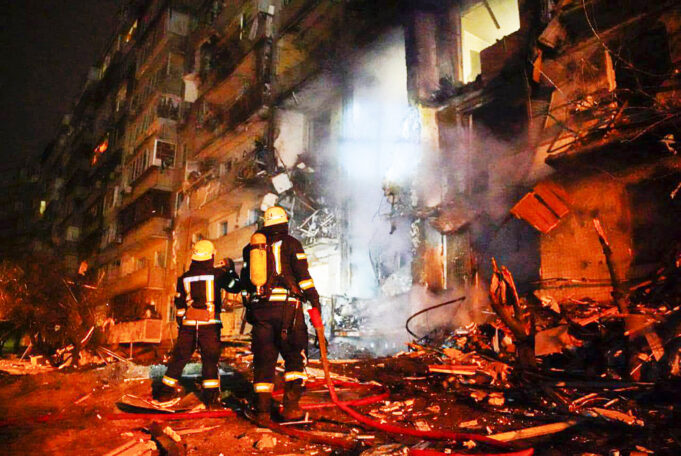Deadly conflict explodes fully in Ukraine bringing greater uncertainty, insecurity and fear WWIII could be on horizon
by Naba’a Muhammad and Brian E. Muhammad
The Final Call Newspaper @TheFinalCall
Russian troops struck around and in the capital city of Kyiv as air raid sirens were heard across the country with the continued assault on Ukraine.
Tearful civilians, shocked and traumatized as bombs fell and buildings were destroyed, scurried about.
The fighting, in its third week by March 14, continued to exact a human toll. Thousands of soldiers and civilians have died, including a pregnant woman and her baby, after Russia bombed the maternity hospital where she was meant to give birth. The war has forced more than 2.8 million people to flee Ukraine.
Russian troops refocused their efforts to seize Kyiv March 14, firing artillery on suburbs, a local official said on Ukrainian television.
The official also said a town councilor for Brovary, east of Kyiv, had been killed in fighting there and shells fell on the towns of Irpin, Bucha and Hostomel, which have seen some of the worst conflict during Russia’s stalled attempt to take the capital.

The office of Ukrainian President Volodymyr Zelensky reported airstrikes hit residential buildings near the important southern city of Mykolaiv, as well as in the eastern city of Kharkiv. A television tower in the Rivne region in the northwest was blocked out. Explosions also rang out overnight around the Russian-occupied Black Sea port of Kherson.
Russia’s military said 20 civilians were killed by a Ukrainian ballistic missile strike in the eastern city of Donetsk, in the separatist Donetsk region. The claim couldn’t be independently verified.
Then there was the question of how many would die on both sides as Russians tried to take control of Ukraine’s huge capital city?
The UN recorded at least 596 civilian deaths, though it believes the true toll is much higher. Ukraine’s Prosecutor General’s office said that at least 85 children are among the dead.
At Final Call press time, a fourth round of talks ended without a breakthrough after several hours, with negotiators planning to resume meetings on March 15. President Zelensky has called on Russian President Vladimir Putin to meet with him directly, a request that has not been met by the Kremlin. Meanwhile a Kremlin spokesman denied media reports alleging that Russia asked China for military assistance to help advance its offensive in Ukraine.
The images of destroyed buildings, bodies and huge craters left by Russian bombs dropped on its neighbor looked as though hell itself had erupted. Or was hell just beginning?
Robert Freeman in a piece titled, “How the U.S. Could Solve the Ukraine Crisis Tomorrow,” wrote: “Russia’s assault on Ukraine is an unambiguously bad thing. But it didn’t happen in a vacuum. In order to solve the problem, we have to first understand the context in which it occurred, and the part that the U.S. played in its happening.”
“The Big Bang in U.S.-Russian relations was the breakup of the Soviet Union in 1991. Then-U.S. president George H.W. Bush and his Secretary of State, James Baker, promised Mikhail Gorbachev that if he agreed to the unification of Germany, NATO would not expand eastward, toward Russia, ‘not one inch.’
“That promise was broken almost immediately when, in 1999, Bill Clinton helped usher Poland, Hungary, and the Czech Republic into NATO. Russia considered this move not just a betrayal, but an act of aggression. First, Poland is an implacable enemy of Russia, and has been for centuries. And NATO had just finished bombing Russian ally Yugoslavia out of existence. The ‘slav’ in Yugoslavia signifies the same ethnicity as the Slavs who are the Russian people.
He added: “It is lost on the average American that Russians are spooked by Western aggression.”
The solution? “If the U.S. is sincerely interested in a peaceful resolution of the crisis—and for argument’s sake, let’s assume that it is—it can attain that end with two simple moves: declare that Ukraine will not be admitted into NATO; and remove its offensive nuclear missiles from Russia’s borders,” said Mr. Freeman, founder and executive director of The Global Uplift Project.
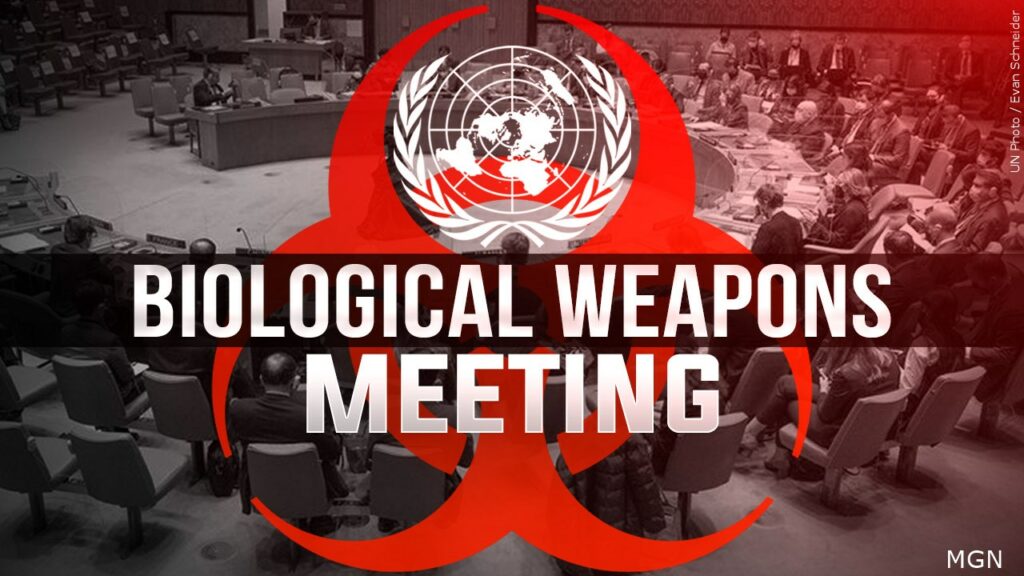
“We can’t risk making things worse and escalating into something that could be a war between nuclear armed powers,” argued Kevin Martin, president of Peace Action. Putting people in the streets of American cities is good and shows solidarity but won’t impact Russia’s decision to pursue war, he said.
Over the March 13 weekend protestors took to streets in Europe calling for an end to the war.
Meanwhile some in Congress and elsewhere called for greater American involvement Ukraine as devastating images were seen around the world.
Anti-war voices are telling the U.S. government to stop intervening in Ukraine, stop arming and training the Ukraine military, and rethink the sanction regime on Russia, which will eventually hurt Americans and European Union countries, warned Margaret Flowers of PopularResistance.com.
“It’s hurting us in terms of the money that’s going into the military as opposed to going into social programs here at home,” said Ms. Flowers. “Really there’s no reason for NATO to exist at this point except that it’s a tool of U.S. imperialism and that’s not acceptable.”
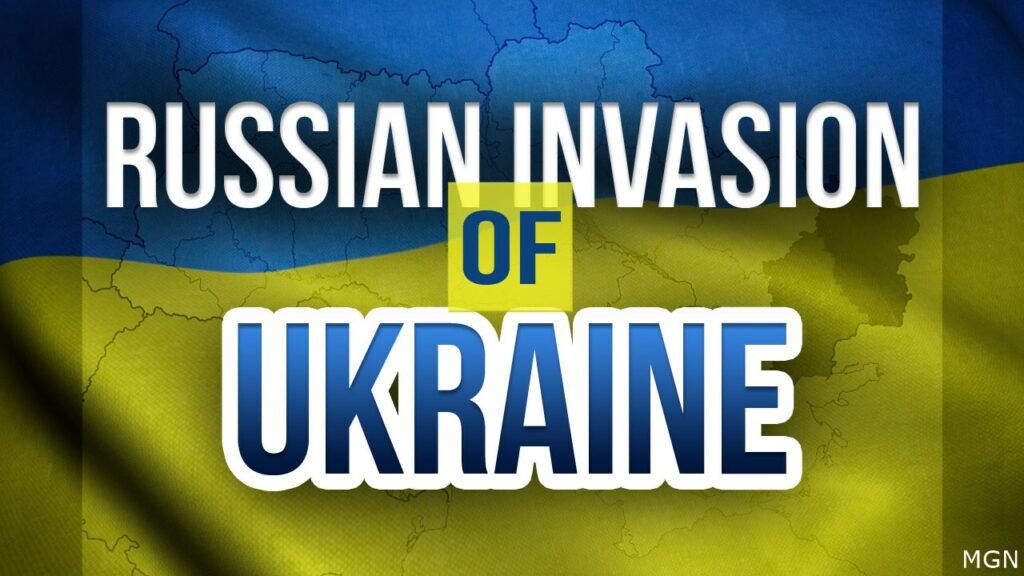
America is posturing as a dominant power in a changing world where there are other powers like Russia and China, she added.
Since the beginning of the war in late February, U.S. President Joe Biden has maintained American boots on the ground is out of the question. However, he has authorized an uptick of U.S. troop levels in NATO member nations bordering Ukraine. Congress approved a $13.6 billion aid package for Ukraine that includes military and humanitarian aid on March 10.
On the same day, Vice President Kamala Harris travelled to Poland to deliver antiballistic patriot missiles.
President Zelensky has been requesting the international community establish a “no-fly zone” which experts say would bring the U.S. in direct engagement with Russia.
A Russian air strike near Poland showed how easily a shooting war between America, her NATO allies and Russia could start: Poland is part of NATO and an attack there could trigger a military mutual aid agreement that would bring Western nations into the fray.
War has not been in the appetite of the American public, according to a London-based YouGov poll commissioned by the Charles Koch Institute last December.
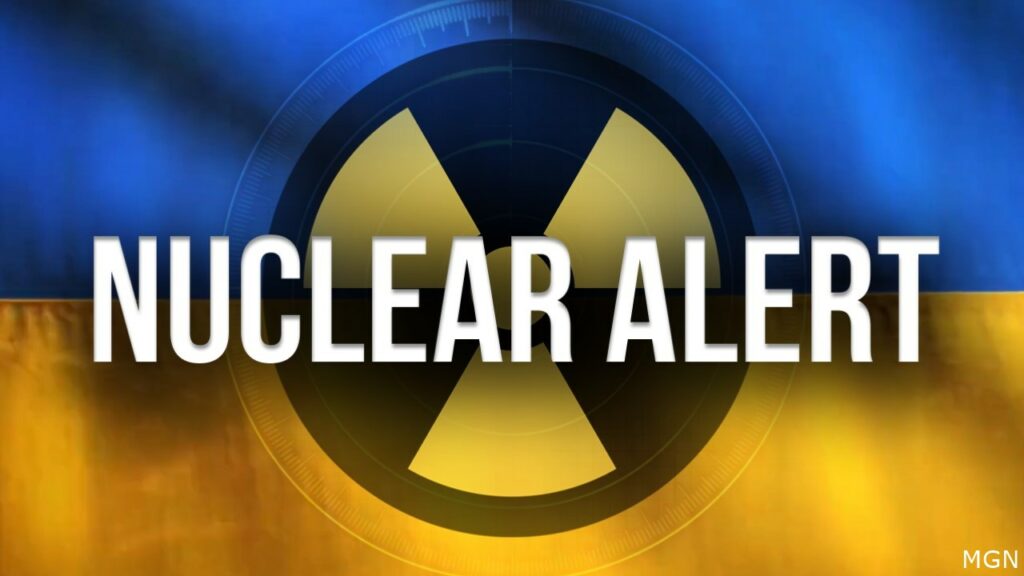
After failed wars in Vietnam, Iraq, and Afghanistan, the poll shows most Americans are war weary. It found 73 percent of respondents were generally against America going to war with Russia, if it were to invade Ukraine, and preferred more focus on domestic priorities over foreign issues. Only 27 percent favored going to war. Forty percent of respondents indicated they would like to see America less militarily engaged around the world, compared to only 10 percent who favored increasing military involvement globally.
“America has no moral authority in any of this,” said Kevin Alexander Gray, political commentator, referring to the U.S. track record since World War I and the number of people killed in U.S. recent wars.
Mr. Gray argued the weight of the response to Russia should come from the European Union and continent as it’s a problem of White Europeans.
There is growing concern the conflict will spread throughout Europe and escalate into a third global war expected to be worse than World War I and World War II.
The Honorable Minister Louis Farrakhan of the Nation of Islam warned the war in Europe would draw America into a final conflict and break her power. In a major address titled, “The Swan Song,” the Minister noted: “Elijah Muhammad says, after the war and unto the end of the war, desolations are determined.” He was speaking of his teacher’s prophetic warning of America’s ultimate fall—which would begin in Europe.
“You can’t win another war. Russia this will be your undoing too. See all White power has to end. The kingdom of God has to be established,” said Minister Farrakhan, speaking Feb. 27 at the Nation of Islam’s Saviours’ Day 2022 observance.
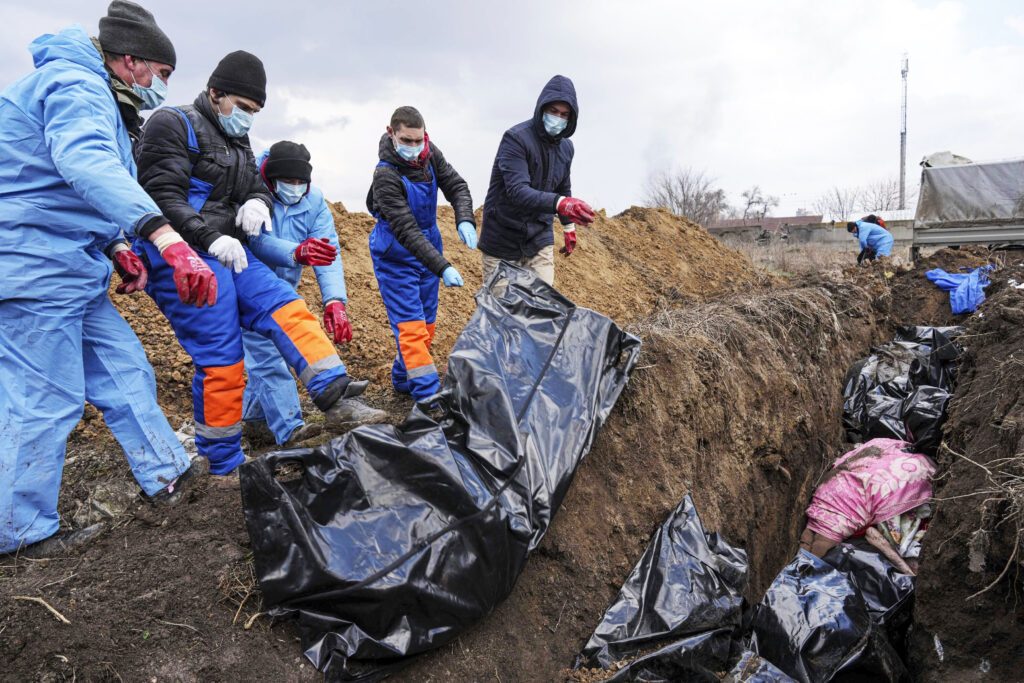
‘We need peace now’
Ukraine is being “decimated before the eyes of the world” with Russia’s military offensive against civilians “reaching terrifying proportions,” said the UN chief March 14, warning that a resulting meltdown of the global economy is provoking a hunger crisis that is hitting the poorest, hardest.
Secretary-General António Guterres addressed correspondents outside the Security Council chamber in New York, and said that with each passing hour in Ukraine, the death and destruction is getting worse: “Whatever the outcome, this war will have no winners, only losers.”
Roads, airports, schools, lie in ruins, due to Russia’s invasion, with at least 24 health facilities suffering attacks, while hundreds of thousands are now without water or electricity.
Mr. Guterres said the UN and humanitarian partners were working “to ensure safe passage from besieged areas, and to provide aid where security permits, allowing around 600,000 to receive some form of aid since the bombardment began.
He announced the release of a further $40 million from the Central Emergency Response Fund to ramp up vital assistance but noted that “the avenues in and out of encircled cities, are more precarious by the day.”
The nearly two million now displaced inside the country, and close to three million who have become refugees in recent weeks—the vast majority women and children—are becoming increasingly vulnerable, he warned.
“For predators and human traffickers, war is not a tragedy. It’s an opportunity. And women and children are the targets. They need safety and support every step of the way. I will continue to highlight the desperate plight of the people of Ukraine as I am doing again today.”
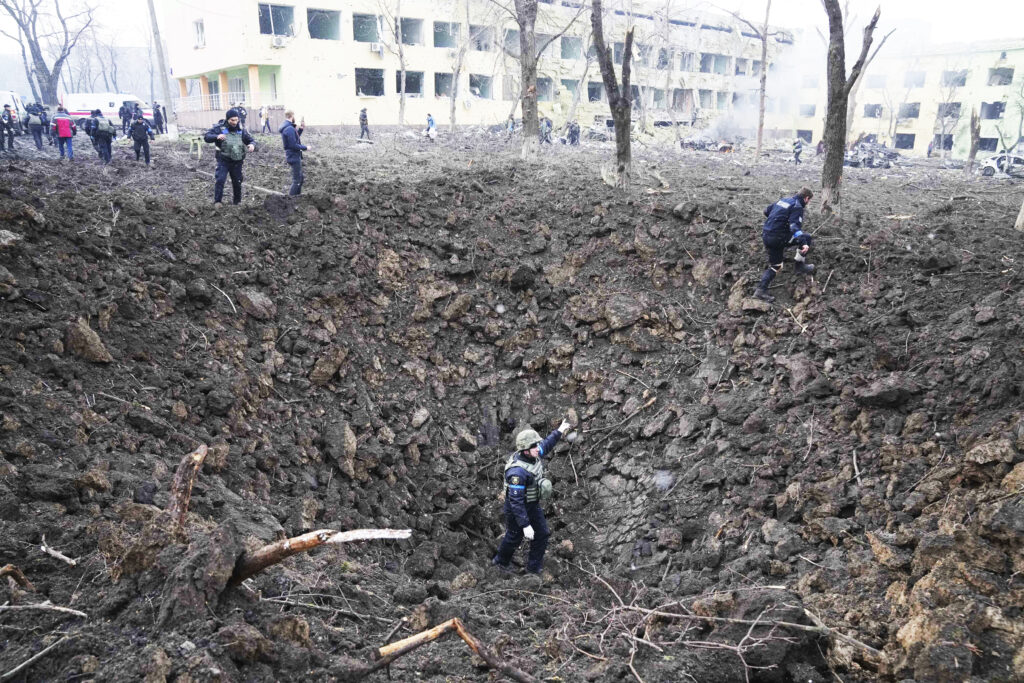
Assault on world’s most vulnerable
Besides the hour-to-hour devastation inside Ukraine, the UN chief said the war was reaching far beyond its borders, with a Sword of Damocles now hanging over the global economy—“especially the developing world.”
For months now, developing countries have been struggling to recover from the pandemic—with record inflation, rising interest rates and looming debt burdens, while their ability to respond has been “erased by exponential increases in the cost of financing.”
“Now their breadbasket is being bombed,” he said.
Russia and Ukraine represent more than half of the world’s supply of sunflower oil and about 30 percent of the world’s wheat, he added, noting that Ukraine alone provides more than half of the World Food Program’s wheat supply.
“Food, fuel and fertilizer prices are skyrocketing. Supply chains are being disrupted. And the costs and delays of transportation of imported goods—when available—are at record levels.
“All of this is hitting the poorest the hardest and planting the seeds for political instability and unrest around the globe,” warned the UN secretary-general.
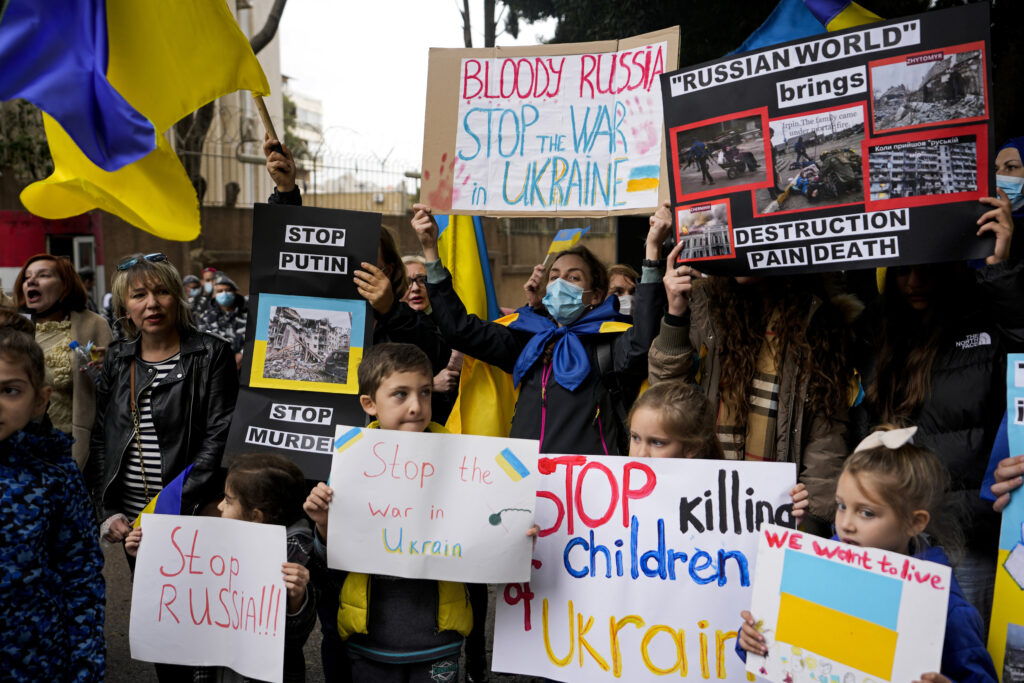
Avert ‘hurricane of hunger’
He said 45 African and least developed countries import at least a third of their wheat from Ukraine or Russia, with 18 of those, importing at least 50 percent.
“We must do everything possible to avert a hurricane of hunger and a meltdown of the global food system. In addition, we are seeing clear evidence of this war draining resources and attention from other trouble-spots in desperate need.”
Mr. Guterres called on countries to find creative ways to finance increased humanitarian and development recovery needs worldwide, to give generously and immediately release pledged funds.
“In a word, developing countries are getting pummeled. They face a cascade of crises–beyond the Ukraine war, we cannot forget covid and the impacts of climate change—in particular, drought.”
As a direct response, he announced the establishment of a new UN Global Crisis Response Group on Food, Energy and Finance, based at the Secretariat in New York, to be overseen by Deputy Secretary-General Amina Mohammed.
He said the war also showed “how the global addiction to fossil fuels is placing energy security, climate action and the entire global economy at the mercy of geopolitics.”
And with Russian President Putin raising the alert level of his country’s nuclear forces, the UN chief described it as a “bone-chilling development.”
The prospect of a nuclear war, “once unthinkable, is now back within the realm of possibility. The security and safety of nuclear facilities must also be preserved,” he added.
“It is time to stop the horror unleashed on the people of Ukraine and get on the path of diplomacy and peace,” he said, noting that he had been in close contact with countries including China, France, Germany, India, Israel and Turkey—on mediation efforts to end Russia’s invasion.
“The appeals for peace must be heard. This tragedy must stop. It is never too late for diplomacy and dialogue. We need an immediate cessation of hostilities and serious negotiations based on the principles of the UN Charter and international law.”
We need peace now, he added. “Peace for the people of Ukraine. Peace for our world.”
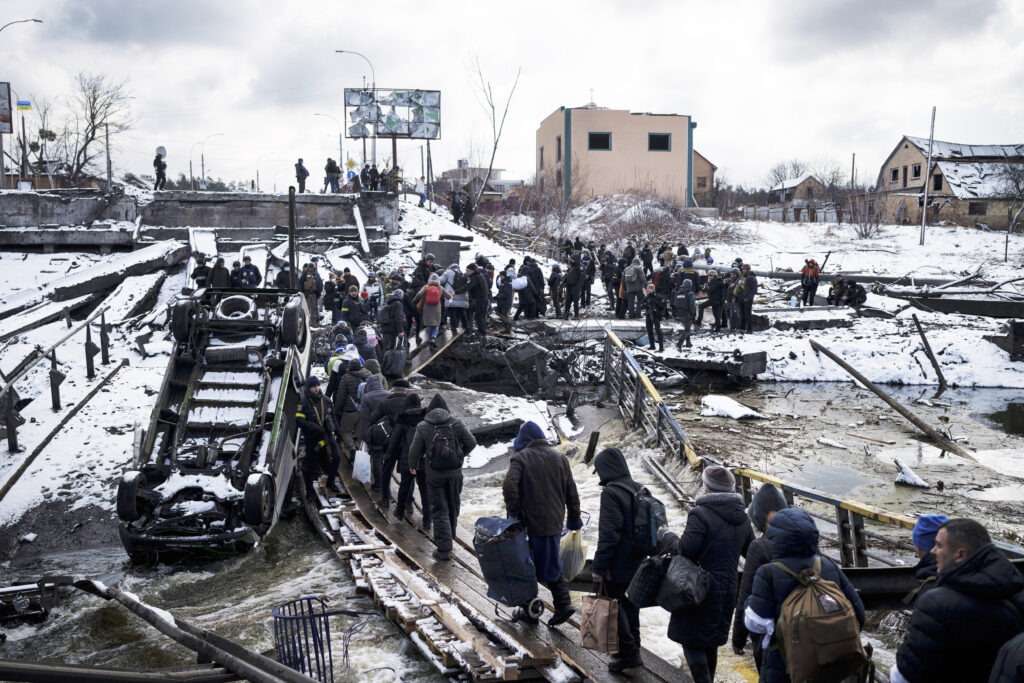
War’s impact far and wide
The Russian invasion sent global stock markets in a tailspin and adversely impacted costs of living in America, Europe, Africa and the Middle East. All are experiencing extreme price hikes of gas and food.
“It’s insane paying this much for gas,” said Mike J., 58, of Columbia S.C. “Last week I doled out $39 to fill my tank. Now, I just paid $52,” he told The Final Call, after filling the tank of his four-door compact.
Mike J.’s story mirrors what consumers are facing in Europe, North Africa, and the Middle East, as governments struggle with the reverberations of the war. The full scale of the war’s impact on world regions will become clearer in coming weeks and months, said analysts.
For America, the strain comes while inflation has skyrocketed in unprecedented numbers before the war.
America and the European Union are united on aggressive sanctions against Russian leaders, wealthy oligarchs, banking, and major business sectors aimed at punishing Russia. President Biden banned all Russian oil imports to America. Oil prices rose to their highest levels since 2008 when the price of Brent crude reached almost $140 a barrel. Blowback toward Europe from the sanctions may cause Western unity to unravel. With 40 percent of its natural gas is supplied by Russia, analysts said Europe does not have the luxury of detaching from the Russian economy like America.
(UN News and the Associated Press contributed to this report.)












